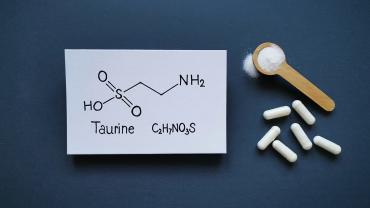
Taurine, a conditionally essential amino acid is found in abundance in seafood. Taurine plays a very important role in energy metabolism and may play a role in metabolic syndrome. There are different diagnostic criteria for metabolic syndrome, but it generally centers around a combination of obesity, insulin resistance, dyslipidemia, and hypertension.
This sulfur-containing amino acid can be provided through the diet and it is synthesized from cysteine and methionine. It plays a role in energy metabolism (promoting the cholesterol conversion to bile acids) and membrane stabilization, and it imparts antioxidant and anti-inflammatory effects. Age, diet, liver disease, and other conditions may increase the risk of a taurine deficiency or insufficiency, which may negatively impact health. Taurine deficiency may contribute to an imbalance of energy metabolism, inclusive of skeletal muscle and adipose tissue. Taurine’s function in the body may also mean it has a connection to metabolic syndrome, especially obesity and glucose metabolism.
Studies have found an association between taurine levels and obesity, including decreased levels of plasma taurine and reduced expression of an enzyme involved in taurine synthesis. Some of the proposed effects of taurine on obesity identified in various studies include stimulating energy expenditure, affecting appetite and satiety, and modulating lipid metabolism and its anti-inflammatory and antioxidant effects. One randomized trial assessed the benefits of taurine supplementation on obesity and found that the plasma levels of the participants who were obese had 41% lower plasma taurine levels compared to the controls. Those taking 3 g of taurine per day for 8 weeks experienced a significant increase in plasma taurine and adiponectin, and a significant reduction in inflammation and oxidative stress.
Taurine may also play a role in metabolic syndrome by supporting healthy glucose metabolism. In one rat study, researchers added 2% taurine to the drinking water of a rat model of insulin resistance. The added taurine mitigated the effects of the high fat and high sugar diet, leading to improved insulin sensitivity and lower serum cholesterol and triglycerides compared to the rats who were not fed the additional taurine. This may have been due to regulating the expression of insulin receptor substate 1 (IRS1) and glucose transporter type 4 (GLUT4), which are involved in the insulin signaling pathway and glucose metabolism. The anti-inflammatory and antioxidant effects of taurine may also impart benefits to glucose metabolism, in addition to the action of taurine on the pancreas to regulate the secretion of insulin, glucagon, and somatostatin.
Taurine plays an important role in many facets involved in metabolic syndrome, including obesity, dyslipidemia, and insulin resistance. Consuming a diet with sufficient protein that includes sources rich in essential amino acids, especially cysteine and methionine, provides taurine sources to help support healthy body composition and healthy glucose metabolism.* Those who struggle with consuming adequate levels in their diet may find benefit from supplementation.
By Kendra Whitmire, MS, CNS